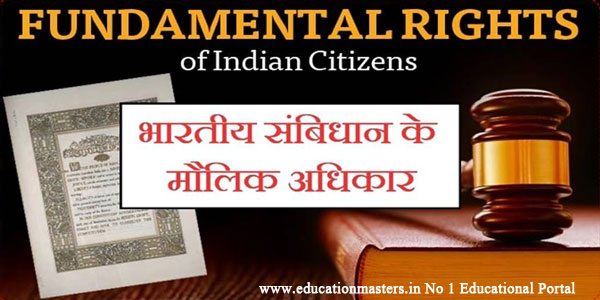क्या आपको पता हैं अपने 6 मौलिक अधिकार - Fundamental Rights
By Kamakshi Sharma | General knowledge | Oct 17, 2018

The fundamental rights of Indian Constitution
fundamental rights वे rights होते है जो व्यक्ति के जीवन के लिए Original and necessary होने के कारण Constitution के द्वारा Citizens को प्रदान किये जाते है। fundamental rights के महत्व के संबंध में Dr. Ambedkar का यह कथन उल्लेखनीय है- ‘‘यदि मुझसे कोर्इ प्रश्न पूछे कि संविधान का वह कौन सा Article है जिसके बिना Constitutional Goods हो जायेगा तो इस Article 32 को छोड़कर मैं किसी और Article की ओर संकेत नहीं कर सकता यह Constitution की हृदय एवं आत्मा है।“
Mr. A.N.Palakipal ने कहा है- ‘‘fundamental rights राज्य के Autocratic स्वरूप से Ordinary citizens की रक्षा करने वाला Armor है।’’
Indian citizens को निम्नलिखित Original right प्राप्त हैं:
1. Right to Equality or Equality (Article 18, Article 18)
2. Right to freedom (Article 19 to 22)
3. Right Against Exploitation (Article 23 to 24)
4. Right to Religious Freedom (Article 25 to 28)
5. Right to Education and Education (Article 29 to 30)
6. Constitutional rights (Article 32)
1.Right to Equality or Equality:
Article 14: विधि के समक्ष समता- इसका meaning यह है कि state सही persons के लिए एक Common law बनाएगा तथा उन पर एक Identical manner से उन्हें Applicable करेगा.
Article 15: Religion, race, caste, sex or place of birth के आधार पर discrimination का Non-state के द्वाराReligion, ethnicity, race, sex and place of birth आदि के आधार पर Citizens के प्रति life के किसी भी क्षेत्र में discrimination नहीं किया जाएगा.
Article 16:Public planning के विषय में अवसर की Parity के अधीन किसी पद पर Employment or appointment से संबंधित विषयों में सभी Citizens के लिए अवसर की Equality होगी| Exceptions - Scheduled Castes, Scheduled Tribes and Backward Classes.
Article 17: Untouchability का अंत- Untouchability के Abolition के लिए इससे Punishable crime घोषित किया गया है.
Article 18: Graduates का अंत- Army या Genial सम्मान के except अन्य कोई भी Degree राज्य द्वारा प्रदान नहीं की जाएगी. भारत का कोई Citizen किसी अन्य देश से बिना President की आज्ञा के कोई उपाधिAcceptance नहीं कर सकता है|
2. Right to freedom:
Article 19- Basic constitution में 7 तरह की Freedom का mention था, अब सिर्फ 6 हैं:
19 (a) Freedom of Speech
19 (b) Peacefully बिना Arms के एकत्रित होने और सभा करने की Freedom.
19 (c) Freedom of association.
19 (d) Country के किसी भी क्षेत्र में Traffic की Freedom
19 (e) Country के किसी भी क्षेत्र में residence करने और बसने की Freedom.
19 (f) Property rights
19 (g) कोई भी business एवं जीविका चलाने की Freedom.
Note: The description of freedom of the press is in Article
19 (a).Article 20- अपराधों के लिए Defect के संबंध में protection- इसके Under तीन प्रकार की Freedom का वर्णन है:
(a) किसी भी person को एक crime के लिए सिर्फ एक बार Punishment मिलेगी.
(b) crime करने के समय जो Law है इसी के Under सजा मिलेगी न कि पहले और बाद में बनने वाले Law के Under.
(c) किसी भी person को Self के विरुद्ध Court में Testimony देने के लिय Bound नहीं किया जाएगा.
Article 21- Life एवं Somatic freedom का सरंक्षण: किसी भी person को विधि द्वारा स्थापित प्रकिया के अतिरिक्त उसके
life और Personal liberty के अधिकार से Deprived नहीं किया जा सकता है.
Article 21(क) state 6 From 14 वर्ष के age के समस्त children को ऐसे ढंग से Free तथा mandatory शिक्षा available कराएगा. (86th Amendment 2002).
Article 22- कुछ दशाओं में Arrest और Contraception में संरक्षण: अगर किसी भी person को मनमाने ढंग से Custody में ले लिया गया हो, तो उसे तीन प्रकार की Freedom प्रदान की गई है:
(1) Custody में लेने का reason बताना होगा.
(2) Within 24 hours (आने जाने के समय को छोड़कर) उसे Magistrate के समक्ष पेश किया जाएगा.
(3) उसे अपने like के lawyer से Seek advice का अधिकार होगा.
3. right against exploitation
Article 23: मानव के Miserable और Labor force का Protest: इसके द्वारा किसी person की खरीद-बिक्री, बेगारी तथा इसी प्रकार का अन्य forcefully लिया हुआ श्रम Forbidden ठहराया गया है, जिसका Violation विधि के अनुसार Punishable crime है.
Note: If required, can be compelled to serve nationally.
Article 24: बालकों के Planning का Protest : 14 वर्ष से कम आयु वाले किसी children को
4. Right to Religious Freedom -
Article 25: Conscience की और religion को अबाध रूप से मानने, manner और Publicity करने की Freedom: कोई भी person किसी भी religion को मान सकता है और उसका propaganda कर सकता है.
Article 26: Religious affairs के प्रबंध की Freedom: person को अपने religion के लिए Colonies की Establishment and nutrition करने, विधि Agreed property के अर्जन, Ownership व Administration का अधिकार है.
Article 27: state किसी भी person को ऐसे कर देने के लिए Bound नहीं कर सकता है, जिसकी Income किसी Special religion अथवा religious denomination की Advancement or nutrition में Expenditure करने के लिए विशेष रूप से Fixed कर दी गई है.
Article 28: राज्य विधि से पूर्णतः Nurtured किसी education institution में religious education नहीं दी जाएगी. ऐसे Teaching संस्थान अपने students को किसीReligious ritual में भाग लेने या किसी Sermon को सुनने हेतु Bound नहीं कर सकते.
5. Rights related to culture and education
Article 29: Minority हितों का protection कोई Minority वर्ग अपनी Language, script, and culture को सुरक्षित रख सकता है और Only language, race, religion and culture के आधार पर उसे किसी भी Government educational institution में प्रवेश से नहीं रोका जाएगा.
Article 30: Educational institutions की Establishment and Administration करने का Minority classes का अधिकार: कोई भी
Minority अपनी पसंद की Educational institution चला सकता है और Government उसे Grant देने में किसी भी तरह का discrimination नहीं करेगी.
6. Right to Constitutional Remedies -
Article 32: इसके Under Fundamental rights को introduce के लिए Appropriate proceedings द्वारा Supreme court में application करने का अधिकार प्रदान किया गया है. इस सन्दर्भ में Supreme Court को पांच तरह के Rit निकालने की Power supply की गई है जो निम्न हैं:
(a) Capture Corp.
(b) Parameters
(c) Prohibition Articles
(d) Origination
(e) Rights page article
other related links:
- {उत्तराखंड} : संरक्षित प्राचीन स्मारक और धरोहर [Uttarkhand GK In Hindi]
- {Uttarkhand GK In Hindi}: Major Festivals Of Uttarakhand
सरकारी नौकरियों, जीके अपडेट्स और करेंट अफेयर्स की ताज़ा जानकारी सबसे पहले पाने के लिए:
-
हमारे WhatsApp चैनल को फॉलो करें:
https://whatsapp.com/channel/0029Vb6sjZz0wajwDXcd5B0U -
हमारे Telegram चैनल को फॉलो करें:
https://t.me/educationmastersin -
हमारे Facebook Page को फॉलो करें:
https://www.facebook.com/educationmastersindia






.png)
.jpg)
.jpg)


